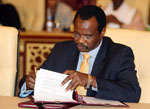
An important Darfur rebel faction has merged with a coalition of rebel groups that signed an agreement in March to enter into peace negotiations with the Sudanese government. The unification presents a step forward to finding peace in a region that has been wracked in chaos and violence for almost a decade. Talks between the government and rebels have stalled since the start of Sudan’s elections, and many rebel groups still remain outside of the process. The coalition group, known as the Liberation and Justice Movement, or LJM, announced the unification with rebel group Sudan Liberation Army-Abdel Shafi, or SLA-AS, on Monday.
The merging of the two groups is a small breakthrough after months of frustrated international mediation efforts to unify disparate rebel groups into a cohesive force—one that would have enough bargaining power at the table vis-à-vis Khartoum. A number of rebel groups, including SLA-AS, had remained outside of the coalition because of disagreement over how LJM’s organizational hierarchy would be restructured to divide power fairly among the different factions.
Rebels were wary of the fact that LJM leader, Tijani Seise had no history of involvement with the Darfur rebel movement prior to the current talks. Seise’s determination to maintain his hold on power in spite of international and Darfuri calls for greater inclusivity in the peace process has added to this lack of confidence. (For more on the ins and outs of the peace talks so far, click here to read Enough’s latest paper.)
But, this latest union between LJM and Abdel Shafi’s group appears to be more motivated by personal interests and power than the hope for an inclusive peace deal. Reportedly, SLA-AS was offered senior representation within the coalition as an incentive for joining. According to the Sudan Tribune, the rebel group’s leader (and namesake) Ahmed Abdel Shafi expects to be appointed vice president of LJM.
The decision to join the rebel coalition coincides with the decline of SLA-AS’s political and military relevance; the rebel group has recently seen the loss of significant territory in western Darfur and political leadership. Likewise, the addition of Abdel Shafi, a rebel leader that hails from the Fur tribe, will politically boost the Liberty and Justice Movement.
“Tijani is trying hard to convince Darfuris and the international community that his group is the most viable and ethnically diversified group, but he is consolidating his power among groups that are weak and heterogeneous,” said Enough Policy Advisor Omer Ismail. “It will take him awhile to create a cohesive group, and build their capacity to negotiate with the GoS, [or Government of Sudan]. With the government ready to come back to the table on May 15th, time will be another enemy for the Tijani Seise.”
At the press conference Monday, LJM also announced the integration of four other rebel groups: SLA-Unity, SLA-National Consensus, SLA-Abu Haraz, and the Banner of Democratic Sudan. But, according to SLA-Unity representatives, the group has not joined the coalition. The militarily significant faction remains committed to a handful of other rebel groups who continue to resist unification with LJM. Rebel leader Abdel Wahid al-Nur—significant for his support among displaced Darfuris—also remains out of the picture.
Photo: Leader of rebel coalition group Tijani Seise signs framework agreement with Government of Sudan.

